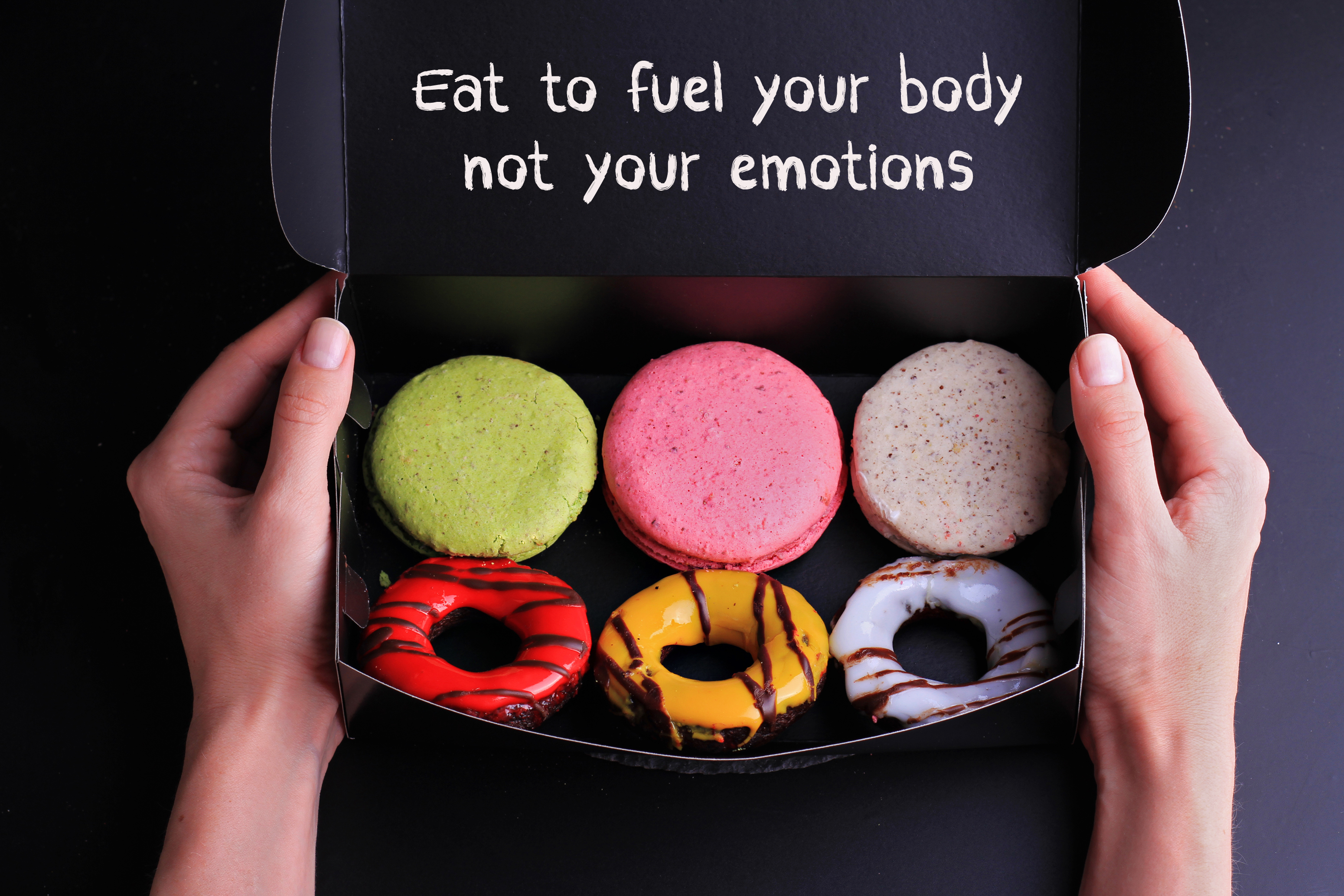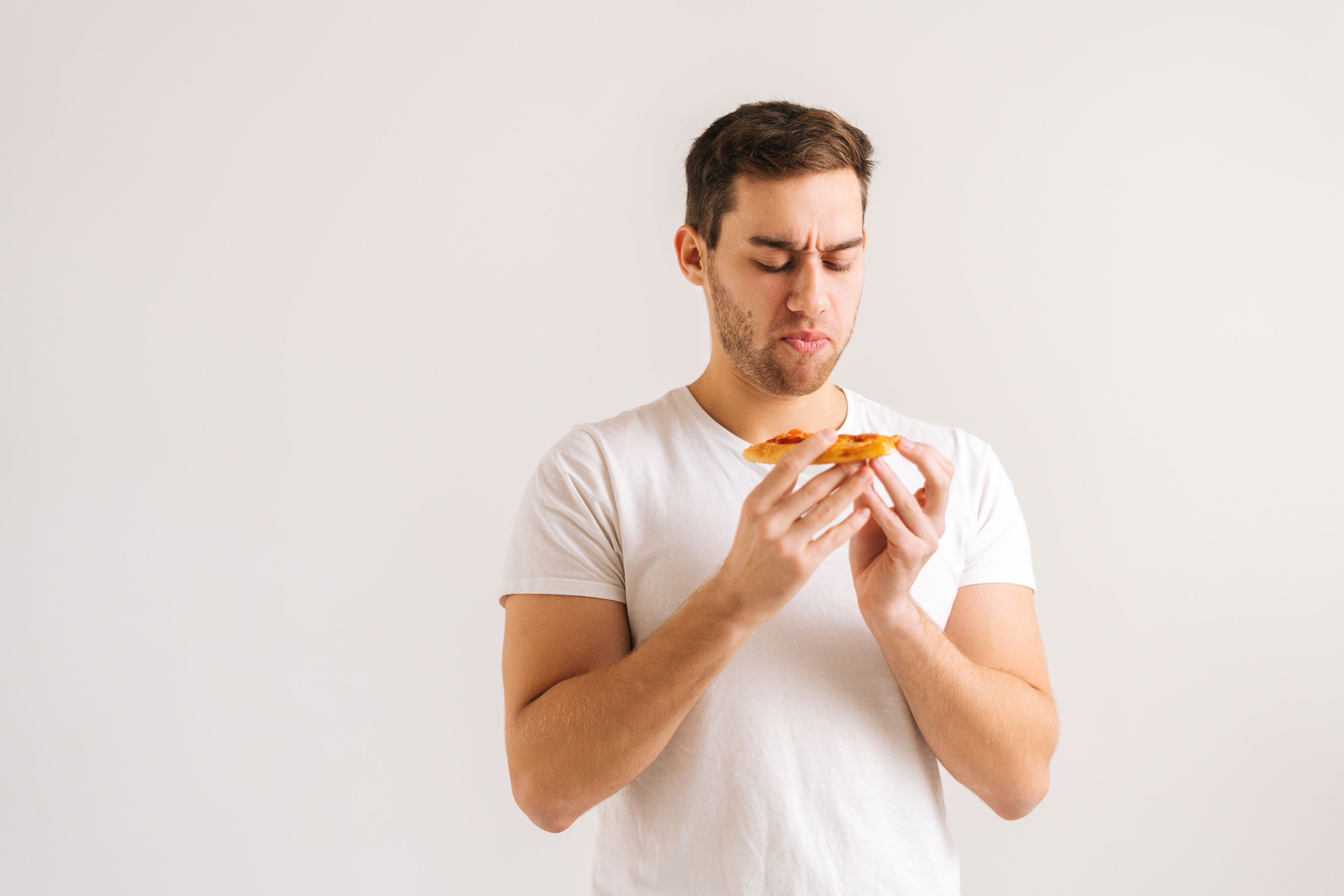What is emotional eating?
Emotional eating is when you turn to food in order to alleviate negative emotions. Feeling stressed, upset, run down, or angry can trigger emotional eating.
With emotional eating, it’s often not considered a problem until it’s deeply nested, by which point it’s a tricky cycle to break.
Relying on a tub of ice cream to perk you up or a bag of chips after a long, exhausting day at work is a coping mechanism of many. However, in the long run, emotional eating actually makes you feel worse.
After eating, the emotional problem is still there despite having given into your food cravings, and you also feel the guilt of leaning on comfort food, too.
Emotional eating is a specific type of eating disorder, but it’s often not taken as seriously as other eating disorders.
The reality is: emotional eating is dangerous, and it’s an eating disorder that affects so many of us.

Have I got an emotional eating disorder?
It’s important to note that eating your favourite foods as an occasional treat is no bad thing.
Even relying on your favourite meal or treat as a reward or to help you feel better isn’t always a sure sign of an emotional eating disorder.
The problem, however, comes when you’re using food as your dominant mechanism to manage emotions. Unfortunately, there’s still a mental health stigma surrounding processing and managing emotions. This causes many of us to resort to emotional eating.
If you find that, whenever you’re feeling any sort of negative emotion, your impulse is to head to the fridge, freezer, or takeaway app on your phone, that’s a convincing sign of emotional eating.
With that in mind, here are some symptoms that indicate you might have an emotional eating disorder:
- You engage in “stress eating” (ie: eating when experiencing and to alleviate stress)
- You eat even when you’re not hungry, or continue eating when you’re full
- You’re binge eating to help yourself feel better against emotions like stress, anxiety, boredom, burnout and loneliness
- You frequently use food as a reward
- Food reduces a sense of powerlessness. Eating makes you feel safe, and even less lonely
- Equally, food creates a sense of powerlessness. You feel you can’t control yourself around food.
It’s important to note that these signs of emotional eating don’t all need to be displayed to be diagnosed with an emotional eating disorder. That said, if you’re learning how to overcome emotional eating, being able to determine whether you’re suffering from one is the first step.
The emotional eating cycle
Managing emotional eating can be a challenge because you’re working hard to break eating behaviors and coping mechanisms.
Many emotional eaters get stuck in an unhealthy cycle:
- Something in your life causes negative and/or uncomfortable emotions
EG: “I’ve had an awful day at work.” - You experience an urgeto eat
EG: “I’m going to order my favourite takeaway.” - You satisfy hunger but continue eating
EG: “I’ll finish this and then grab a pudding even though I’m full.” - You feel worse, experiencing guilt and a loss of power
EG: “Why did I eat all of that? I feel terrible about myself.”
After reaching stage 4, the unhealthy cycle begins again.
Realistically, emotional hunger isn’t actually about food. These hunger cues are speaking more about your mental health than your physical hunger levels.
While eating might provide relief from uncomfortable emotions in the short-term, the initial problem is still there after you’ve finished eating. Only you’re having to deal with the discomfort of knowing you’ve given into emotional cravings.
Overcoming emotional eating is not only good for your physical health (and for weight loss) but your mental health, too.
The difference between emotional hunger and physical hunger
If you want to break the unhealthy cycle of emotional eating, you need to understand and distinguish between emotional and physical hunger.
This may sound obvious, but if you’re experiencing an emotional eating disorder, it can be difficult to spot the difference.
Emotional hunger is ruthless and feels exactly like physical hunger. So, it can sometimes feel like it’s impossible to pinpoint whether you’re experiencing physical hunger or emotional hunger.
Yet, there are a few signs you can look for to help you determine the difference between physical and emotional hunger.

- Emotional hunger is sudden with no gradual build upIf you feel a sudden urge to eat and a deep hunger without any gradual build up, it’s more likely to be an emotional craving rather than being physically hungry.Physical hunger cues, on the other hand, are far more gradual and build up over time.
- Emotional hunger feel like a specific cravings hitUsually, emotional hunger is far more picky than your standard physical hunger.If you’re physically hungry, you’ll eat a range of meals. With emotional hunger, however, you’ll crave certain foods – often comfort food and junk food.When experiencing emotional hunger, cravings often demand sugary, salty food choices. That’s why people eat junk food and sweet snacks when living with an emotional eating disorder.
- Emotional hunger doesn’t seem to let you stop eatingWhen you’re trying to decode your hunger, make sure you’re paying attention to your food intake.If you’re physically hungry, after eating you’ll feel full, and you’ll no longer have an urge to eat.When you’re emotionally eating, though, it’s unlikely your hunger will feel satisfied, and your fullness cues will appear unresponsive.
- Emotional hunger coincides with strong emotionsThe final clue that your eating habits may point toward emotional eating is that you feel the urge to eat when you’re experiencing anxiety, feel stressed or are processing negative and difficult emotions.If you notice hunger cues when you’re struggling and you believe food will soothe negative emotions, there’s a good chance you’re an emotional eater.
What are emotional eating triggers?
A key step to overcoming emotional eating is to identify emotional eating triggers.
These “triggers” are usually external factors that make you feel out of control, provoking strong and negative emotions.
This can be a challenge because there are many different emotional eating types, and everyone is different. Emotional eating is not a one-size-fits-all condition.
However, it’s worth making note of your unique circumstances when your eating patterns correlate to strong emotions.
Common causes of emotional eating
As mentioned, everyone experiences emotional eating differently. The causes and triggers will be unique to the person.
That said, there are a few patterns in terms of triggers to emotional eating. These include:
- Financial pressures
One in ten UK adults feel “hopeless” about their financial circumstances. This can lead to severe anxiety and depression, causing them to turn to food in an attempt to reduce stress. Unfortunately, these financial pressures can be a core cause of emotional eating. - Boredom
There are many comedic sketches that show a character eating comfort food because they’re bored. We laugh because we resonate, but the reality is that boredom is a key cause of emotional eating. It feels second nature to open a bag of crisps while watching tv, or snacking on unhealthy foods while waiting for a parcel to turn up.
Boredom can lead to unhealthy eating habits. Don’t underestimate the power of feeling aimless. - Conflict
Whether you’re arguing with a family member, a partner, a friend, or a colleague, conflict can spark difficult emotions such as stress, anger, sadness, and even guilt and regret. These strong emotions can cause an inability to gain control, making us give into our food cravings and engage in binge eating. - Trauma
When dealing with trauma, it’s best to speak to a mental health professional. Trauma can cause alexithymia (being unable to understand and/or express your own feelings,) which causes people to turn to food to help spark positive emotions. These coping mechanisms become fully-fledged eating disorders, suppressing the trauma itself and adding guilt, shame, and a loss of control.

Keeping an emotional eating diary
If you’re hoping to stop emotional eating, a fantastic strategy is to keep a food diary.
Often recommended for those who are experiencing reactions to certain foods, keeping a food diary allows you to log all the relevant information to help you stop emotional eating.
You should use your food diary to note how you’re feeling when you experience hunger cues. Are you, for example, feeling stressed when food cravings hit? Make sure you’re paying attention to the context that could trigger emotional eating.
Make note, too, of your food cravings. What did you feel you had to eat? Did you feel an urge to eat a healthy snack? Or, perhaps, unhealthy foods like junk food?
Finally, make sure you document your food intake and your satisfaction levels. Did you feel full after eating? Or did you experience more cravings even after consuming your comfort food?
Being able to spot and identify your eating patterns will make overcoming emotional eating easier, as you’re able to gain control and put yourself in the driver’s seat.
Alternatives to emotional eating
When you eat emotionally, you can feel a complete lack of control.
So, what are the alternatives? What can you do instead of eating to help manage your emotions?
- Speak to a friend for peer support
- Exercise – go for a walk or a light jog
- Read – keep your mind occupied. It’s more effective to read than watching tv, as your brain is required to work harder
- Take a bath or shower
- Eat a healthy snack
How to stop emotional eating
If you’re aiming to stop emotional eating, you’ll need a strategy.
What works for one person may not work for another, so it’s important to keep checking in with yourself.
Remember, too, that if you feel your eating habits are out of control, you should speak with a mental health professional and your GP.
- Pause when cravings hit and check in with yourselfIf you’re experiencing food cravings, before you give in, take a deep breath and pause. Ask yourself: am I really hungry?Remember to decode your hunger, focusing on the difference between physical and emotional hunger.
Don’t give into mindless eating before assessing whether your mind is tricking you into eating emotionally. - Practice mindful eatingMindful eating is the practice of being aware of what you’re consuming.It also extends to the physical sensation of the eating process, helping you assess your feelings toward food.
Not only will mindful eating help you slow down while eating, but it’s also a great tactic for weight loss. - Support yourself with healthy lifestyle habitsHealthy lifestyle habits are worth the time and effort they take to implement. Not only will it help you overcome emotional eating, but you’ll also reap the benefits of weight loss, experiencing more positive emotions, and generally feeling fantastic.Habits like ensuring you drink between 6 and 8 glasses per day and getting at least 7 hours or more of sleep every night will help you feel prepared and strong enough to stop emotional eating.
- Make healthy choicesIn your battle to overcome emotional eating, you are your greatest ally. Being an emotional eater can be tough, as you’re trying to break a ruthless cycle.You can help yourself by making your lifestyle as healthy as possible.Remember that your physical health correlates to your mental health, and can therefore be a way to soothe negative emotions all by itself.Get enough exercise, boost your endorphins, swap out processed foods for their healthier counterparts, and make an active effort to improve and enhance a healthy lifestyle.
- Don’t be so hard on yourselfManaging emotional eating and even overcoming it isn’t an easy journey. You’re challenging eating behaviours and habits that you’ve built up over a period of time, and emotional eating can be just as challenging as giving up any other sort of addiction.With that in mind, it’s important to show yourself self-compassion and kindness.Set small goals and celebrate them when you reach them. Remember, emotional eating is a real condition. Simply acknowledging that you’re an emotional eater is a huge step forward.

Seeking support
Managing emotional eating can be a challenging and difficult time – particularly if you’re doing so without peer support.
It’s important to note that emotional eating is nothing to be ashamed of. It’s a real condition that impacts many of us.
Unfortunately, a large proportion of emotional eaters don’t spot the problem and believe their eating habits are normal and healthy.
That said, if you’re looking for support with emotional eating, consider reaching out to Beat Eating Disorders.
Beat Eating Disorders have helplines that are open every day of the year from 9AM until midnight during the week and 4PM until midnight over the weekends.
Phoning the helpline is 100% free. You’re also able to use their 1:1 online chat.
Overcome emotional eating
Emotional eating promotes unhealthy eating behaviours.
When you eat emotionally, you’re relying on food to help process and manage your emotions. This can turn into an unhealthy and vicious cycle, which – over time – can be extremely challenging to break.
So, now’s the time to stop eating emotionally. Not only for weight loss, but for your mental health, too.
Comfort food – despite the title – never truly provides comfort when it’s used as a pacifier. And while uncomfortable emotions can be difficult to process and manage, it’s important to handle them without the aid of food.
Remember, too, that you should speak to a mental health professional if you feel you’re unable to gain control and/or if your mental health is suffering due to an emotional eating disorder.
A poll finds

Adults need between

The Eatwell Guide says we should drink

While we've ensured that everything you read on the Health Centre is medically reviewed and approved, information presented here is not intended to be a substitute for professional medical advice, diagnosis, or treatment. It should never be relied upon for specific medical advice. If you have any questions or concerns, please talk to your doctor.




